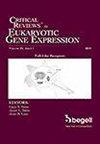MS4A3 通过 THAP1/EGFR 通路促进肺癌的化疗敏感性
IF 1.5
4区 医学
Q4 BIOTECHNOLOGY & APPLIED MICROBIOLOGY
Critical Reviews in Eukaryotic Gene Expression
Pub Date : 2024-06-01
DOI:10.1615/critreveukaryotgeneexpr.2024053662
引用次数: 0
摘要
MS4A3 在多类型癌症中发挥着肿瘤抑制因子的作用。然而,MS4A3 在肺癌中的作用仍然未知。因此,本研究旨在探讨 MS4A3 在肺癌中的潜在作用。研究采用 RT-qPCR 检测 mRNA 表达。CCK-8和集落形成试验测定细胞增殖。进行管道形成试验以确定血管生成情况。使用流式细胞仪计算细胞凋亡率。使用 JASPAR 确定 THAP1 的结合基序。进行荧光素酶和 ChIP 检测,以验证 MS4A3 可与 THAP1 相互作用,使表皮生长因子受体转录失活。MS4A3 在非小细胞肺癌(NSCLC)患者中下调,这预示着非小细胞肺癌患者的临床预后不佳。过表达的 MS4A3 会增强 NSCLC 细胞对奥希替尼的化疗敏感性。此外,MS4A3 还能抑制 NSCLC 细胞的增殖和血管生成,并促进其凋亡。此外,MS4A3 还能上调与细胞凋亡相关的 THAP1,使表皮生长因子受体失活。然而,THAP1的敲除会削弱MS4A3的作用,并促进NSCLC细胞的恶性行为。MS4A3 在 NSCLC 中具有抗肿瘤基因的功能。MS4A3/THAP1/EGFR信号增强了肺癌对表皮生长因子受体酪氨酸激酶抑制剂(TKI)的化疗敏感性。本文章由计算机程序翻译,如有差异,请以英文原文为准。
MS4A3 promotes the chemosensitivity of lung cancer via THAP1/EGFR pathways
MS4A3 functions as a tumor suppressor in multi-type cancer. However, the role of MS4A3 in lung cancer is still unknown. Therefore, this study aims to investigate the potential of MS4A3 in lung cancer. RT-qPCR is carried out to detect mRNA expression. CCK-8 and colony formation assay are conducted to determine cell proliferation. Tube formation assay is performed to determine angiogenesis. Flow cytometry is used to calculate apoptosis rates. JASPAR is used to determine the binding motif of THAP1. Luciferase and ChIP assay are conducted to verify that MS4A3 can interact with THAP1 to transcriptionally inactivate EGFR. MS4A3 is downregulated in non-small cell lung cancer (NSCLC) patients, which predicts poor clinical outcomes of NSCLC patients. Overexpressed MS4A3 enhances the chemosensitivity of NSCLC cells to Osimertinib. Moreover, MS4A3 suppresses the proliferation and angiogenesis and promotes the apoptosis of NSCLC cells. Moreover, MS4A3 upregulates apoptosis-related THAP1 to inactivate EGFR. However, THAP1 knockdown attenuates the effects of MS4A3 and promotes the malignant behavior of NSCLC cells. MS4A3 functions as an anti-tumor gene in NSCLC. MS4A3/THAP1/EGFR signaling enhances the chemosensitivity of lung cancer to EGFR tyrosine kinase inhibitor (TKI).
求助全文
通过发布文献求助,成功后即可免费获取论文全文。
去求助
来源期刊

Critical Reviews in Eukaryotic Gene Expression
生物-生物工程与应用微生物
CiteScore
2.70
自引率
0.00%
发文量
67
审稿时长
1 months
期刊介绍:
Critical ReviewsTM in Eukaryotic Gene Expression presents timely concepts and experimental approaches that are contributing to rapid advances in our mechanistic understanding of gene regulation, organization, and structure within the contexts of biological control and the diagnosis/treatment of disease. The journal provides in-depth critical reviews, on well-defined topics of immediate interest, written by recognized specialists in the field. Extensive literature citations provide a comprehensive information resource.
Reviews are developed from an historical perspective and suggest directions that can be anticipated. Strengths as well as limitations of methodologies and experimental strategies are considered.
 求助内容:
求助内容: 应助结果提醒方式:
应助结果提醒方式:


